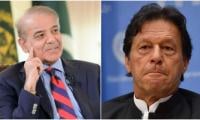ISLAMABAD: A dead professor and numerous defunct organisations were resurrected and used alongside at least 750 fake media outlets in a vast 15-year global disinformation campaign to serve Indian interests, a new investigation has revealed.
The man whose identity was stolen was regarded as one of the founding fathers of international human rights law, who died aged 92 in 2006.
"It is the largest network we have exposed," said Alexandre Alaphilippe, executive director of EU DisinfoLab, which undertook the investigation and published an extensive report on Wednesday, BBC reported.
The network was designed primarily to "discredit Pakistan internationally" and influence decision-making at the UN Human Rights Council (UNHRC) and European Parliament, EU DisinfoLab said.
EU DisinfoLab partially exposed the network last year but now says the operation is much larger and more resilient than it first suspected.
The network relies heavily on amplifying content produced on fake media outlets with the help of Asian News International (ANI) - India’s largest wire service, and a key focus of the investigation.
The EU DisinfoLab researchers, who are based in Brussels, believe the network’s purpose is to disseminate propaganda against India’s neighbour and rival Pakistan.
Last year, the researchers uncovered 265 pro-Indian sites operating across 65 countries, and traced them back to a Delhi-based Indian holding company, the Srivastava Group (SG).
Wednesday’s report, titled Indian Chronicles, reveals that the operation, run by SG, is spread over at least 116 countries and has targeted members of the European Parliament and the United Nations - raising questions about how much EU and UN staff knew about SG’s activities, and whether they could have done more to counter those activities, especially after last year’s report.
Alaphilippe said the EU DisinfoLab researchers had never encountered such co-ordination between different stakeholders to spread disinformation.
“During the last 15 years, and even after being exposed last year, the fact that this network managed to operate so effectively shows the sophistication and the drive of the actors behind Indian Chronicles,” he said.
“You need more than a few computers to plan and sustain such an action,” he said.
Ben Nimmo, a disinformation network expert, said the uncovered network was “one of the most persistent and complex operations” he had seen, but he too was wary of attributing it to a specific actor.
Nimmo, who is director of investigations at digital monitoring firm Graphika, cited previous examples of privately-run large-scale troll operations. “Just because they’re big, it doesn’t necessarily mean they’re directly run by the state,” he said.
Of ghosts and defunct NGOs
One of the most important findings of the open-source investigation was establishing direct links between the SG and at least 10 UN-accredited NGOs, along with several others, which were used to promote Indian interests and criticise Pakistan internationally.
“In Geneva, these think tanks and NGOs are in charge of lobbying, of organising demonstrations, speaking during press conferences and UN side-events, and they were often given the floor at the UN on behalf of the accredited organisations,” the report says.
The investigation shows that the operation led by SG began in late 2005, a few months after the UNHRC was founded in its current form.
One particular NGO which caught the eye of the researchers was the Commission to Study the Organisation of Peace (CSOP). The CSOP was founded in the 1930s and won UN-accreditation in 1975 but became inactive later in the 1970s.
The investigation found that a former chairman of the CSOP - Prof Louis B Sohn, one of the 20th Century’s leading international law scholars and a Harvard Law faculty member for 39 years - was listed under the name Louis Shon as a CSOP participant at the UNHRC session in 2007 and at a separate event in Washington DC in 2011.
The listings shocked the researchers because Prof Sohn died in 2006.
The authors dedicated their investigation to the professor’s memory, writing that his name had been “usurped by the malicious actors in this report”. They said CSOP “had been resurrected, and its identity hijacked in 2005 by the same actors depicted in our first investigation”.
The investigation also shows there were several hundred pro-Indian interventions by the non-accredited NGOs, which were repeatedly given the floor at the UNHRC on behalf of the accredited organisations, pursuing the same agenda of maligning Pakistan.
On other occasions, NGOs and organisations which seemingly had nothing to do with Pakistan or India according to their stated objectives would get the opportunity to speak at the UNHRC and target Pakistan.
In March 2019, during the UNHRC’s 40th session, United Schools International (USI), another UN-accredited organisation with direct links to SG, allowed its slot to be used by Yoana Barakova, a research analyst with an Amsterdam-based think-tank called the European Foundation for South Asian Studies (EFSAS).
Ms Barakova spoke about “atrocities committed by Pakistan” during the session. She told the BBC that EFSAS was a partner with USI and she was “not responsible for organisational logistics”.
The primary news agency re-packaging and boosting pro-India content related to SG appears to be ANI, established in 1971, which describes itself as “South Asia’s leading multimedia news agency, with more than 100 bureaus in India, South Asia and across the globe”. Indian news media, especially broadcast media, thrive on content provided by ANI.
EU DisinfoLab found at least 13 instances of ANI re-publishing mostly anti-Pakistan and sometimes anti-China op-eds by Members of the European Parliament (MEPs), originally published on EU Chronicle, one of the fake news sites linked to SG.
EU Chronicle was born in May this year when EP Today, a site flagged in the previous disinformation report, was simply discontinued and renamed.
The EU DisinfoLab report said: “The actors behind the operation hijacked the names of others, tried to impersonate regular media such as the EU Observer... used the letterhead of the European Parliament, registered websites under avatars with fake phone numbers, provided fake addresses to the United Nations, created publishing companies to print books of the think-tanks they owned.
“They used layers of fake media that would quote and republish one another. They used politicians who genuinely wanted to defend women or minority rights to ultimately serve geopolitical interests and gave a platform to far-right politicians when convergent objectives could be reached.”
Alaphilippe said the news agency ANI was being used to give legitimacy to the entire “influence operation”, which relied “more on ANI than on any other distribution channel” to give it “both credibility and a wide reach to its content”.
ANI’s news reports have found space in many mainstream Indian news outlets and publishers. Its content was further reproduced on more than 500 fake media websites across 95 countries, the researchers found.
Demonstrations in Europe conducted by organisations linked to the Srivastava Group have also been covered by ANI, as well as by fake media websites linked to SG.
Focus on the EU and UN
According to the findings of the investigation, the disinformation network had a two-pronged strategy to spread influence.
In Geneva, the think-tanks and NGOs were in charge of lobbying and protesting, and taking the floor at the UNHRC on behalf of accredited organisations.
In Brussels, the focus was on the MEPs, who were taken on international trips and solicited to write “exclusive” op-eds for fake outlets like EU Chronicle, which would then be amplified using ANI, the researchers found.
A group of MEPs appear regularly in the investigation. One of them, French MEP Thierry Mariani, has written two op-eds for EU Chronicle and was also part of a controversial visit to Indian Occupied Jammu and Kashmir last year.
“If the Indian government is behind the newspaper [EU Chronicle], it is not my problem,” Mariani, a member of France’s far-right National Rally, was quoted as saying.
Two other MEPs named in the report - Angel Dzhambazki from Bulgaria and Grzegorz Tobiszowski from Poland - denied having written op-eds that were published on EU Chronicle. The articles under their names were also reproduced on ANI.
Asked what the EU is doing to fight disinformation networks, EU spokesperson on foreign affairs Peter Stano pointed to the action taken to expose EP Today last year.
“Exposing the disinformation and those who spread it is one of our main instruments,” he said. “We will continue to identify them and call them out.”
But he said questions about finances and transparency of NGOs registered in Brussels were for Belgian authorities to answer.
Rolando Gomez, a spokesperson for the UNHRC, said it was the prerogative of NGOs to raise whichever issue they wish to address and whoever they grant space to speak on the floor.
“There are no rules stating that an NGO must speak to specific issues. Doing so would amount to infringing on their freedom of speech,” Gomez said.
Gary Machado, managing director of EU DisinfoLab, said he thought the muted reaction to the revelation of the disinformation network was partly because it was “clearly managed by Indian stakeholders”.
“Imagine if the same operation was run by China or Russia. How do you think the world would have reacted? Probably with international outrage, leading to public inquiries and probably sanctions,” he said.
But the activities of MEPs named in the report prompted criticism from some of their colleagues.
MEP Daniel Freund from the Greens said fellow members needed to declare their activities.
“There have been at least 24 breaches of rules in the past years. Not a single violation has been sanctioned. So there is little incentive to respect the rules when the worst that can happen is to file a declaration after you have been caught,” he said.
Another member, who did not want to be named, said MEPs contributing to sites like EU Chronicles had been identified as “election tourists”.
“A ragtag group of MEPs from the bottom of the parliamentary barrel who prefer to travel on sponsored trips by unsavoury governments rather than invest in their mandate,” the MEP said. “How PR stunts with such individuals could be even conceived as helpful is baffling.”
Who are the Srivastavas - and what next?
The investigations from last year and this year show a man called Ankit Srivastava at the centre of the entire global operation that was uncovered. More than 400 domain names have been bought through Srivastava’s private email address or through email addresses belonging to his organisations, the EU DisinfoLab investigations found.
Then, there’s a case of the mysterious SG-owned tech firm Aglaya. Its website has been inaccessible since at least February this year but in the past the company has advertised products for “hacking/spy tools” and “information warfare services”.
Aglaya’s marketing brochure mentioned the ability to “hamper country level reputations” and described some of its services as “Cyber Nukes”. In a 2017 interview with Forbes magazine, a man called Ankur Srivastava claimed he “only sold to Indian intelligence agencies”.
It’s unclear what relation, if any, he has to Ankit Srivastava.
A third Srivastava appears to be Dr Pramila Srivastava, chairperson of the group and mother of Ankit Srivastava.
Dr Harshindar Kaur, a paediatrician from the Indian state of Punjab, told the EU DisinfoLab researchers that in 2009 she had been invited to the UNHRC in Geneva to give a lecture on female foeticide when she was threatened by a woman called Dr P Srivastava, who claimed to be a “very senior government official from India”.
Dr Kaur said it was Pramila Srivastava who had threatened her.
What might happen to the network, or how it might evolve, in the light of the latest investigation is unclear.
The authors of Indian Chronicles say their findings “should serve as a call to action for decision-makers to put in place a relevant framework to sanction actors abusing international institutions”.
Alaphilippe said following the 2019 investigation there had been “no official communication, no sanction, nothing. This passivity gave a message to Indian Chronicles: you’ve been exposed, but no consequences”.
“We think there should be consequences to disinformation and we expect actions to be taken. The biggest failure from institutions would be if another report is released next year on the same actors with the same techniques,” he said.
“This would mean that EU institutions are ok with foreign interference.”
Meanwhile, Prime Minister Imran Khan warned the world of the “rogue Indian regime”, which he said was now threatening “the stability of the global system”.
“Pakistan has consistently drawn attention of int community to India’s subversive activities to undermine democracies in the region; & export/ fund extremism through structures of fake news orgs & ‘think tanks’,” the premier said on Twitter.
“Recently GoP provided dossier to UN of India’s state terrorism in Pakistan,” he added, referring to proofs that Foreign Minister Shah Mehmood Qureshi had said New Delhi was unable to respond to.
He also underlined the revelations made by EU DisinfoLab “on the widespread Indian network of subversive activities vindicates Pakistan’s position & exposes its detractors”.
“The international community needs to take notice of a rogue Indian regime that now threatens the stability of the global system,” Imran Khan wrote.
Mariana Baabar adds: Condemning India’s systematic tactic of trying to malign Pakistan and international institutions through a mass propaganda campaign, the Foreign Office said that all these efforts were doomed to fail.
“All such attempts were doomed to fail as Pakistan has already put forth irrefutable evidence, extensively documenting India’s active planning, promoting, aiding, abetting, financing and executing terrorist activities in Pakistan,” said the spokesman, adding that this report is clearly a vindication for Pakistan as it substantiates Pakistan’s position in front of the international community.
“By spreading such falsehoods, India can neither cast a shadow on the international stature of Pakistan nor can it divert the attention of the international community from India’s horrendous human rights record,” he said.
Pakistan said the Indian propaganda has been exposed and its credibility is zero now. Pakistan said the issue will be raised at every platform.
Foreign Minister Shah Mehmood Qureshi tweeted, “No surprises as world’s largest disinformation network exposed India sitting atop a 15 years global disinformation campaign designed in attempt to discredit Pakistan internationally and influence global decision making ‘incredible India’ powered by fascist ideals and disinformation that even puts Goebbles to shame.”
The spokesman pointed to threats of false flag operations from India and warned New Delhi of such a misadventure as it had a history of using Pakistan card to score political points and to shift focus from its profound failures of governance, faltering economy, state sponsorship of terrorism and violation of minority rights.
“Pakistan has been consistently sensitising the international community regarding the possibility of India resorting to a false flag operation and our armed forces are vigilant and ready to respond to any misadventure or miscalculation by India,” he said.
According to the Foreign Office, Indian forces had increased ceasefire violations on the Line of Control, and were targeting civilian areas with artillery fire, heavy-calibre mortars and automatic weapons. This year alone, Pakistan has recorded 2,840 ceasefire violations by India that have killed 27 people and injured 245 others. India claims a similar number of fatalities and injuries.
Meanwhile, as Pakistan joined the international community in observing the International Human Rights Day, the Foreign Office made special mention of Indian Occupied Jammu and Kashmir (IIOJK).
“On this day, we must particularly keep in our thoughts and prayers the oppressed people of IOJ&K who are not only being denied their inalienable right to self-determination for over seven decades, but also facing gruesome repression at the hands of Indian occupation forces acting with full impunity,” said the Foreign Office.
It pointed to August 05, 2019 since when Kashmiris are enduring the worst form of human rights violations.
“Their suffering has increased manifolds during the global pandemic. In defiance of its obligations under the UN Charter, the UNSC resolutions and international law, especially the 4th Geneva Convention, India is seeking to alter the demographic structure of the occupied territory,” reminded the Foreign Office.
India’s gross and systematic violations of human rights in IOJ&K have been comprehensively documented in the two Kashmir reports of the UN Office of the High Commissioner for Human Rights (OHCHR) as well as by the UN Special Procedure Mandate Holders, international civil society, and the media.
“Pakistan reiterates its call on the international community to hold India accountable for serious crimes against the Kashmiri people in IOJ&K. India must be called upon to accept a UN Commission of Inquiry for an independent and impartial investigation of the situation in IOJ&K and fully respect the human rights and fundamental freedoms of the Kashmiri people,” said the Foreign Office.
Sources say that Pakistan would conclude several agreements catering to economic cooperation between two countries
Trend of deportations has been rising significantly, say immigration sources
Secretary says that joint venture approach would delay privatisation process, whereas direct sale could expedite...
FBR seeks suggestion from relevant stakeholders for preparation of upcoming budget for 2025-26
Former PM Imran Khan receives no visitor from family, friends and legal team in Adiala jail on Thursday
Governor SBP says that volatility in inflation could pose challenges for businesses and households in near term







